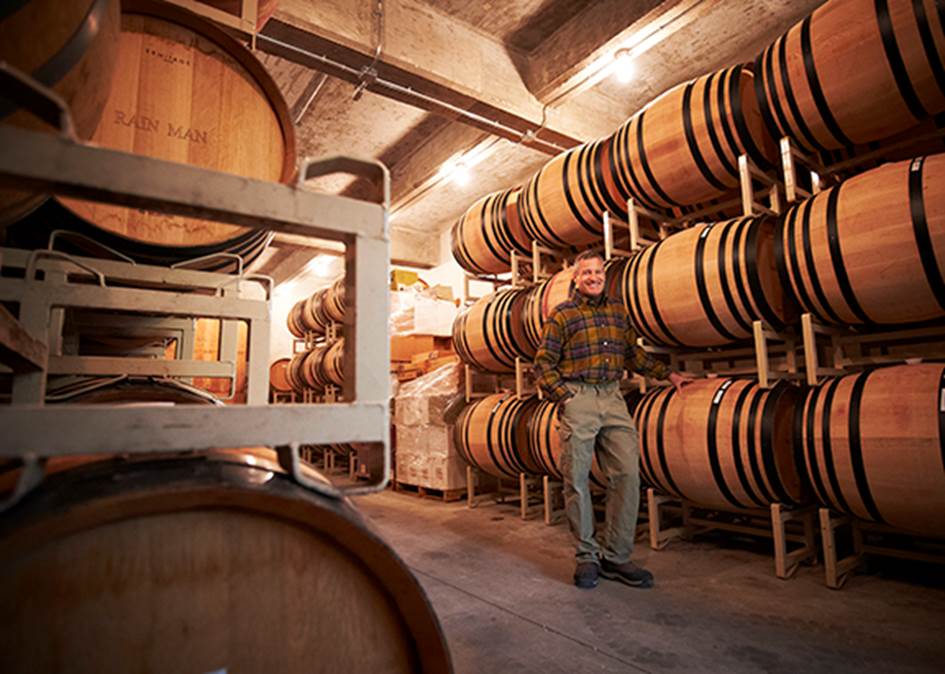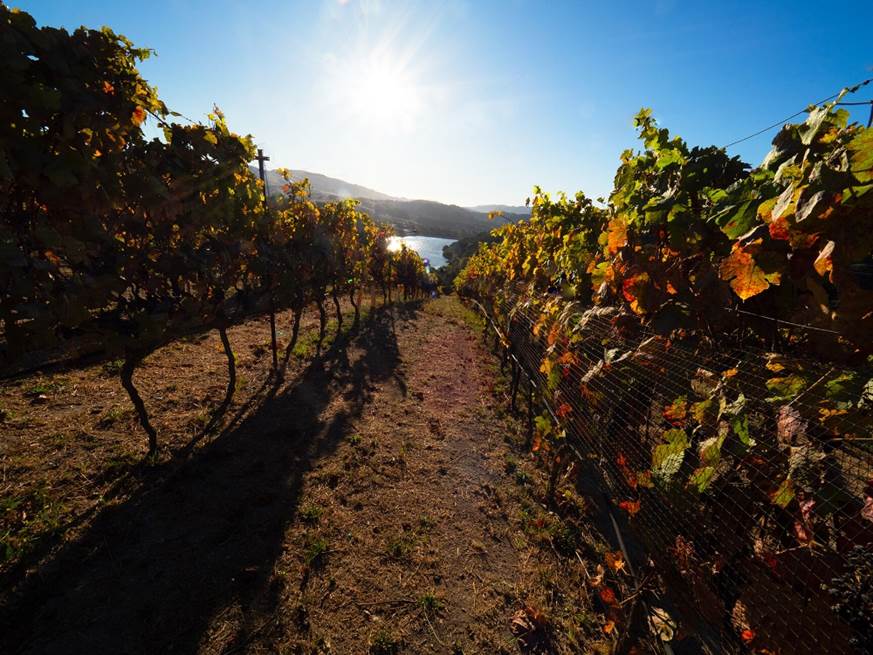Alban Vineyards California Rhone Ranger Wine Tasting with Special Guest Jared Alban
Wednesday, January 15, 2025 - 07:30 PM
This Event has been read: 198 times.
"You haven't drunk too much wine if you can still lie on the floor without holding on." ~ Dean Martin
When you look at the Rhone Rangers of California the godfather in most people’s opinion is none other than John Alban. We are excited to hvae the next generation of the Alban family Jared Alban here to break bread at the Wine Bar in 2025.
Alban Vineyards California Rhone Ranger Wine Tasting
with Special Guest Jared Alban
Wednesday, January 15, 2025
7:30 PM
2023 Alban Vineyards Viognier Central Coast
2021 Alban Vineyards 'Patrina' Syrah Edna Valley
2019 Alban Vineyards Syrah Reva Alban Estate Vineyard
2019 Alban Vineyards Lorraine Estate Syrah Edna Valley
2013 Alban Vineyards Lorraine Estate Syrah Edna Valley
2012 Alban Vineyards Seymour's Vineyard Syrah Edna Valley
2010 Alban Vineyards Lorraine Estate Syrah Edna Valley
2004 Alban Lorraine Syrah Edna Valley
2002 Alban Vineyards Reva Syrah Alban Estate
Menu
Selection of Cheese and Charcuterie
Seared Hudson Valley Foie Gras with Sauteed Wild Mushrooms and Grilled Brioche Toast
Seared Ancho BBQ King Salmon Served over Black Bean Puree with Roasted Pepper Salsa
Colorado Rack of Lamb with Mongolian BBQ and Sweet Potato Au Gratin
Dark Chocolate Creme Brulee with Raspberry Coulis
The fee for this tasting which includes dinner is $295 + tax, for reservations call 954-523-9463 or e-mail andy@winewatch.com. Please let us know when you make your reservations if you have any food allergies of aversions and chefs Toni and Dani will be happy to accommodate you.
I would try to tell the story of this producer but John does an amazing job describing his journey, this excerpt comes from his website: https://www.albanvineyards.com/about

“Before I was old enough to drink wine (legally), I spent a lot of time wondering why Europe fermented over 500 different grape varieties, while California was using about 6. The strangest part was that people only drank 2 of the six. Fortunately, I was too young to recognize that anyone seriously planning to change how many wine types were being produced in California would have to contend with the American love affair with Cabernet and Chardonnay; our wine equivalents of chocolate and vanilla.
Far into my quest for wine grapes that would make sense for California, I celebrated my 24th birthday. That evening a friend handed me a glass of Condrieu. Knowing nothing about the wine, and informed simply (though erroneously) that it was cheap, I downed what would prove to be one of the most significant gulps of my life. Instantly I could see myself producing the world's greatest six-dollar bottle of wine. I envisioned myself hanging out with the Gallo boys. The next day I researched everything U.C. Davis had on the subject of Condrieu- about 12 sentences. I learned 3 key facts: Viognier is the grape of Condrieu, it ain't cheap, and I'd soon be moving to the Rhone if I wanted to learn much more.
I frantically completed my course work and research for my Master's in enology at Davis, immersed myself in everything Rhone, and applied for a scholarship that was being offered by the Franco-American chamber of commerce. The degree "allowed" me to start re-paying my student loans, the Rhone immersion kept me smiling, and the scholarship was my ticket to France.
While apprenticing anywhere producers would let me- from Beaujolais to Provence, I also spent a good bit of time organizing climate and soil information. Everything I found indicated that Syrah, Grenache, Viognier and Roussanne made more than mere sense for California. The information left me puzzling over how we ever planted Chardonnay from Ukiah all the way down to Temecula. I would have plenty of time to puzzle as my next 6 years would be spent 'picking up sticks'.
Vines are propagated from vines. Just as it's tough to get a chicken without an egg and vice versa, it's impossible to get vines without vines. Because there was essentially no Grenache Noir, Roussanne, or Viognier in California at that time, and the clones of Syrah were few and poorly documented, I would need a lot of time to make cuttings. Starting with only a handful of various selections, it took years to generate commercial quantities of the vines I wanted to grow.
Spending all those years in green houses, I lost touch with reality. At a time when there were fewer than 50 acres of Viognier in the world, I propagated 32. Perhaps the only wine more obscure than Viognier was varietally labeled Roussanne. Our release of pure Roussanne in 1991 was the second such wine produced globally and the first from the United States (what exactly Bergeron is remains in doubt).
Since reds take more cellar time, I originally hit the road pouring my two whites-Viognier and Roussanne. If I had not been so young and brash, I might have been discouraged by the barrage of folks who kept telling me that consumers haven't heard of these wines, and no one can pronounce Viognier (Vee-own-yeah is easy to say; tough to read. Anything with the word So-veenyown; as in Cabernet So-veen-yown is truly hard to say).
What I really discovered on my journeys was that compared to the amount of wine I had, there was an abundance of progressively minded folk all over the world open to the idea that delicious is more important than varietal recognition. I am forever indebted to the core group of courageous and passionate wine buyers and sommeliers who championed Alban Vineyards in the early years. The people who were driven to hand-sell and promote wines that in and of themselves were of little economic significance to them. These 'missionaries' nurtured the fledgling California rhone movement, and with it took our wine trade from black and white into the age of color. I am delighted to see Rhone varieties flourish throughout California and rather overwhelmed by Robert Parker's declaration in The Wine Advocate that I am "...the spiritual and qualitative leader of the movement..."
Many of our original customers are now my good friends. Some I have even worked with to help start wineries of their own focusing on Rhone varieties. Two moved to San Luis Obispo County to help organize Hospice Du Rhone- the world's largest international celebration of these wines, visit www.hospicedurhone.org. As the Rhone renaissance became truly international and significantly rooted in what happened here in California, perhaps the greatest surprise in my life thus far was how the story came full circle. In 2005 I was made an honorary citizen and Decurion of Cote Rotie and Condrieu. The sons and daughters of the producers who were terrified about my plans to develop their then threatened varieties internationally, believed that my efforts had actually accelerated recognition and interest in their own wineries. Being presented this distinction before the leaders of these key northern Rhone appellations, on their home turf, remains somewhat surreal to this day.
In some ways my life is still measured in sticks. As more people have discovered the world beyond chocolate and vanilla, there has been an explosion in plantings of these varieties. Alban Vineyards has provided a large portion of the cuttings needed to see California's Viognier acreage go from 0 to over 2000, and Syrah has jumped from a few hundred acres to more than 17,000. Grenache will be next. But the story has gone way beyond change and diversity. Of the 22 wineries in California included in Robert Parker's The World' Greatest Wine Estates, 10 currently make at least one 'Rhone', and 2 produce almost exclusively wines from Rhone varieties. While we Rhone producers may forever be 'garage bands' at heart, our stage is now very much international.

Cart Summary
Your shopping cart is empty!
Wine Watch Events
Wine Bar Closed for Private
Sun, Dec 22, 2024
Wine Bar Closed for Private -Niebla
Wine Bar Closed For A Private Event
Mon, Dec 23, 2024
Wine Bar Closed For A Private Event- Serena
VIntage Port Tasting back to 1985
Fri, Dec 27, 2024
"I made wine out of raisins so I wouldn't have to wait for it to age." - Steven Wright When...
Vintage Champagne Wine Tasting back to 2007 Including Dom Perignon, Louis Roederer Cristal, Taittinger Comtes De Champagne and more
Fri, Dec 27, 2024
An artist is somebody who produces things that people don't need to have. Andy Warhol And you don’...
The Big Eight Bordeaux Wine Tasting
Sat, Dec 28, 2024
Burgundy makes you think of silly things, Bordeaux makes you talk of them and Champagne makes you do them. - J...
The Wine Cave is Booked for a Private Dining Experience
Sat, Dec 28, 2024
Conningsby
Big Bottle Big Baller New Years Eve Party
Tue, Dec 31, 2024
Champagne for My Real Friends, Real Pain for My Sham Friends Tom Waits This is the first tim...
Wine Bar Closed for a Private Event
Thu, Jan 2, 2025
Langer
Wine Bar is Closed for a Private Event
Wed, Jan 8, 2025
Wine Bar is Closed for a Private Event -GQG
Happy Hour Wine Tasting Featuring RIISE wines from Paso Robles with Special Guest Juan Mercado
Thu, Jan 9, 2025
Happy Hour Wine Tasting Featuring RIISE wines from Paso Robles with Special Guest Juan Mercado Thursday, ...
